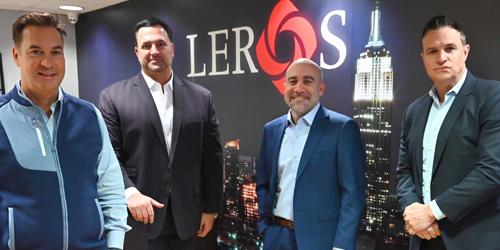BY ROB SMENTEK
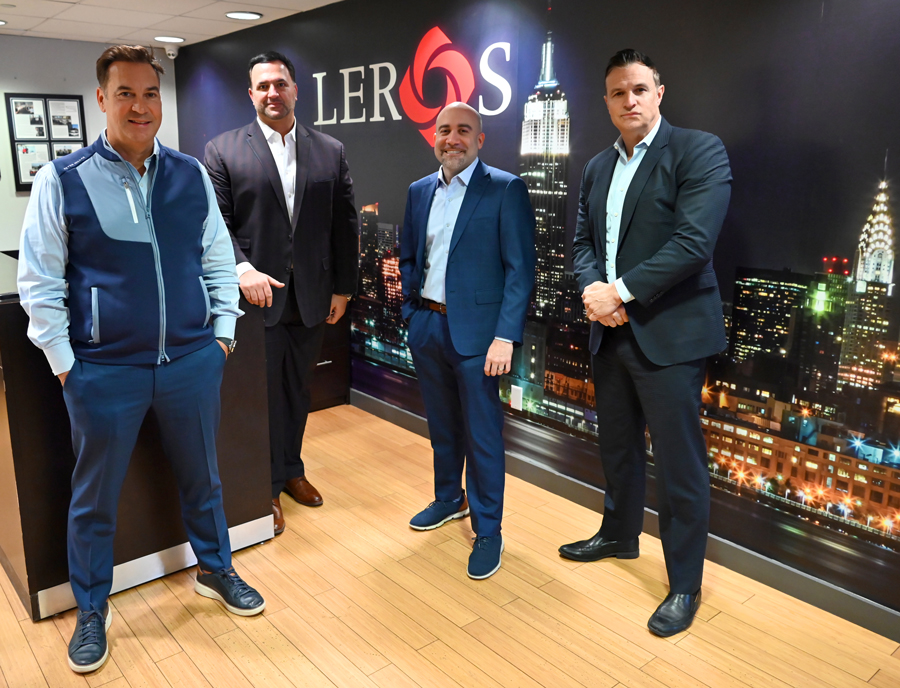 L to R: Leros Transportation Group President & CEO Jeff Nyikos, COO Mike Basso, Executive Vice President Jeffrey Cartagena, and CFO Chris Nyikos
L to R: Leros Transportation Group President & CEO Jeff Nyikos, COO Mike Basso, Executive Vice President Jeffrey Cartagena, and CFO Chris Nyikos
Founded in 1983, Leros Point to Point became one of the most respected luxury ground transportation companies in the country. Now, with a steamrolling momentum after acquiring North Jersey-based operation Royal Coachman in 2019, Leros operates several brands underneath the Leros Transportation Group umbrella, which has expanded their footprint into new markets.
Leros Transportation Group President & CEO Jeff Nyikos is excited about the company’s new path, which largely started as the industry was reshaped by COVID.
“2019 was our best year ever, businesswise,” says Nyikos. “In early 2020, we felt positive about everything going on, and then obviously COVID hit. We went through the worst time in the history of the company. One year of being down almost 90 percent is unfathomable. However, when I play Monday morning quarterback, I wouldn’t change anything we did during 2020. We did everything we wanted to do during that time period, and we never panicked. While people were trying to survive, our plan was acquisitions. It was kind of surreal.”
In June 2020, during the height of the global shutdown, Leros acquired Air Brook Limousine, which Nyikos says was an easy transition simply because there was no other work.
“It was really two years to the day that business returned. And then the fire hydrant opened up,” he says.
Not only did chauffeured transportation work come roaring back, but so did the opportunities for Leros to grow through acquisitions.
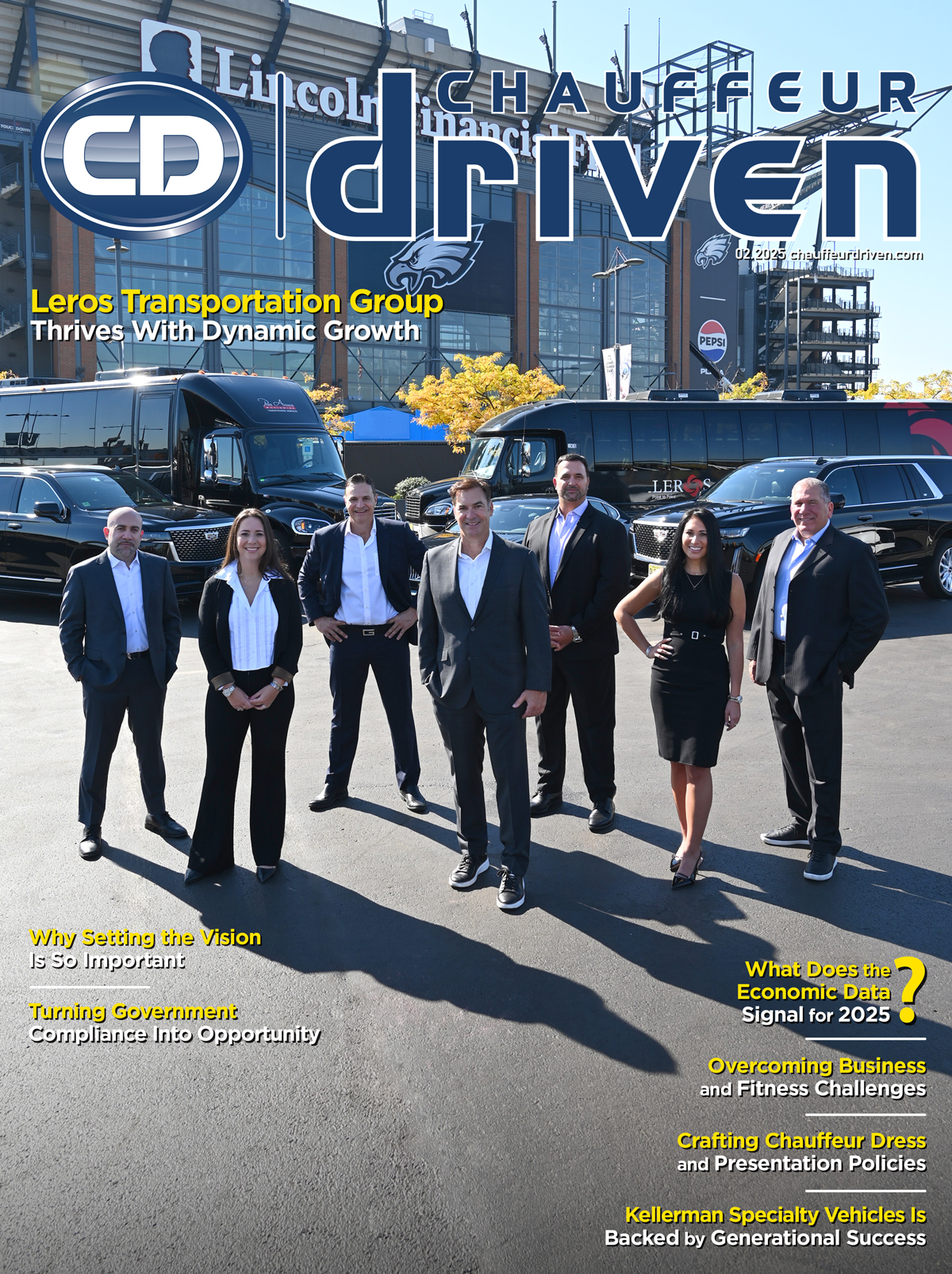 Cover Art: L to R: Jeffrey Cartagena, Park Avenue Worldwide Senior Vice President Chelsea Candeub, Chris Nyikos, Jeff Nyikos, Mike Basso, Park Avenue Worldwide Senior Vice President Briana Candeub, and Park Avenue Worldwide President Alan Candeub at Lincoln Financial Field, home of the Philadelphia Eagles. Photography by Chris Weiss. “After we acquired Air Brook Limousine, then it was All Transportation Network, a smaller company in Hudson Valley. Then in 2022, we acquired Red Oak in our backyard, and finally in September 2024, we acquired Park Avenue out of Philadelphia,” says Nyikos.
Cover Art: L to R: Jeffrey Cartagena, Park Avenue Worldwide Senior Vice President Chelsea Candeub, Chris Nyikos, Jeff Nyikos, Mike Basso, Park Avenue Worldwide Senior Vice President Briana Candeub, and Park Avenue Worldwide President Alan Candeub at Lincoln Financial Field, home of the Philadelphia Eagles. Photography by Chris Weiss. “After we acquired Air Brook Limousine, then it was All Transportation Network, a smaller company in Hudson Valley. Then in 2022, we acquired Red Oak in our backyard, and finally in September 2024, we acquired Park Avenue out of Philadelphia,” says Nyikos.
Now covering an area stretching from New Haven, Conn., to Philadelphia, and almost up to Albany, with a fleet spanning 350 vehicles from sedans to motorcoaches, there is a rhyme and reason to how they purchase companies.
“Every acquisition we make is strategic, and we only consider good companies with good people. It’s not like we’re just running around and gobbling up everybody. There are certain criteria that all these companies have in common: They have good people running the companies, and they have a strong brand with a following. Fast forward to 2025, and we’re now double the size of what we were in 2019, and we went through two years of a pandemic,” says Nyikos.
While the Leros Transportation Group annexed an impressive roster of operations in the North Jersey and New York area, the Park Avenue deal is different as it brought the company into the relatively unfamiliar territory of the Eagles, Rocky, and cheesesteaks.
“We were fortunate that we had worked with Park Avenue President Alan Candeub for years and were very familiar with his staff,” says Nyikos. “But the biggest benefit for us doing the Park Avenue deal is that it really opened us up to a whole new market. Our other acquisitions were kind of in our backyard, so to speak. This was a little different in that it went outside our sweet spot for transportation—and that’s why it’s so important that Briana and Chelsea Candeub are staying on to help grow that operation.”
Nyikos states that maintaining separate brands under the Leros Transportation Group banner is very important to the company.
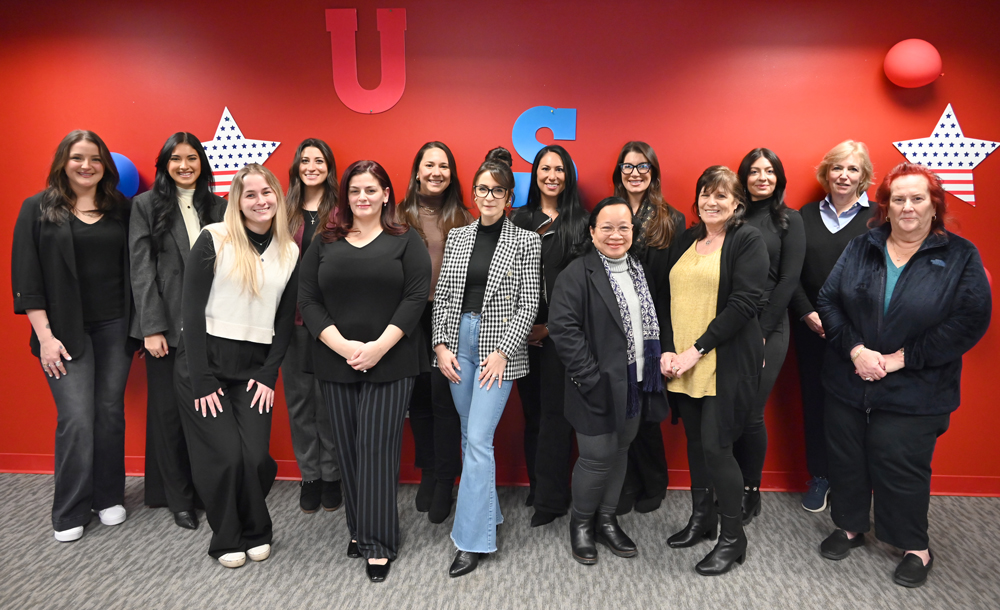 The Leros Transportation Group customer service team “Private equity is not going to come in and drop a bag of cash on the table and say, ‘go retire.’ That’s not realistic,” says Nyikos. “What we do is we basically create an annuity for a business owner. We do what we can do to keep your brand—and legacy—alive in this market. We’re going to take care of the key people and bring them into our team, so that customers are also taken care of. It’s a win-win situation. If you’re Park Avenue, and you’ve been serving Philadelphia for decades with a good name, why would I take away that name on day one and replace it with Leros? No one in that market knows who Leros is. That’s the idea.”
The Leros Transportation Group customer service team “Private equity is not going to come in and drop a bag of cash on the table and say, ‘go retire.’ That’s not realistic,” says Nyikos. “What we do is we basically create an annuity for a business owner. We do what we can do to keep your brand—and legacy—alive in this market. We’re going to take care of the key people and bring them into our team, so that customers are also taken care of. It’s a win-win situation. If you’re Park Avenue, and you’ve been serving Philadelphia for decades with a good name, why would I take away that name on day one and replace it with Leros? No one in that market knows who Leros is. That’s the idea.”
In addition to expanding their luxury ground transportation services, Leros also is tackling a new vertical: meetings services. This division is being spearheaded by Robert Sanders, president of Leros Meeting Services Division, who has more than 30 years of experience in meeting and events.
“This is our feeling: If you look at IBM in the ’70s and ’80s, they sold mainframe computers. That was their business. If you look at them today, they’re a service business. People no longer think of them as a hardware company. You go to them with a problem, and IBM is going to develop a solution. Right now, we’re an old-school ground transportation company, but the idea is to create a new service that’s asset light that can leverage our existing database. We created this division to offer full meetings services, everything from coordinating flights, to sourcing hotels, to providing on-site logistics, including awards dinners or golf outings—whatever you need. And ground transportation is only a small part of that puzzle. We only launched this six months ago and we’ve received a lot of positive feedback. We anticipate that this division is going to grow this year.” On top of that, Nyikos and Sanders have recently entered the podcast game with a program entitled Hospitality Now, which is accessible through Spotify and at lerostg.com.
“What we’re doing is going around and talking to hospitality professionals about what’s happening in the industry, looking at the trends or new technologies, and getting an inside look. We’re using the podcast to promote this new division that we’re building,” he says.
The podcast’s first episode features a conversation with T.J. Fimmano and Tom Spanos from the IBM Gerstner Center for Learning in Armonk, N.Y. Future guests include a representative from the film industry in Westchester, an expert from a hotel association, and someone from the Tao Group Hospitality to talk about membership restaurants.
As the company grows by leaps and bounds, Nyikos is quick to credit the Leros team for their hard work and inspiration.
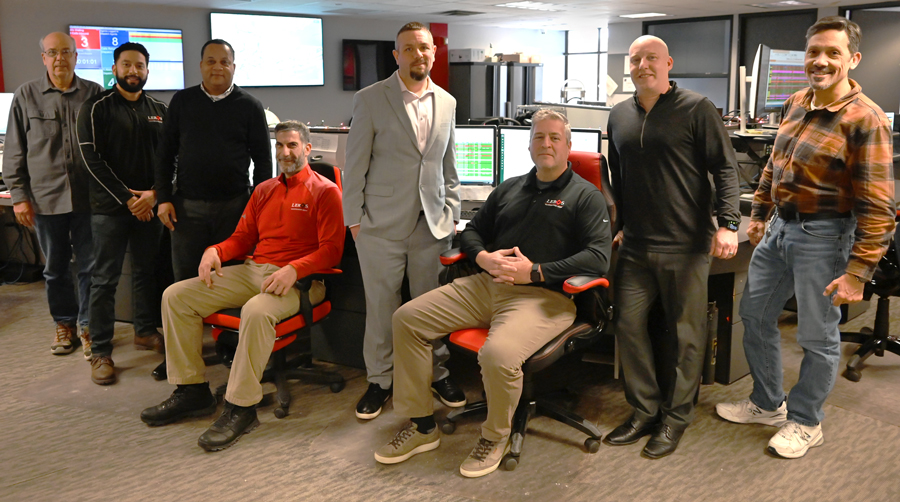 Leros’ New York dispatch team “At the end of the day, the only way you grow is with a great team,” he says. “The reality is that because we have such an excellent team—people like COO Mike Basso, Executive Vice President Jeff Cartagena, CFO Chris Nyikos, Chief Technology Officer Frank Pirrone, Director of Events/Reservations Kelcy Moran, Account Manager Arianna Jimenez; and salespeople like Royal Coachman Vice President Zorian Ricks, Red Oaks Vice President of Sales Ed Stopplemann, Mike Zappone from All Transportation, who handles a lot of our social media marketing, and Park Avenue Worldwide Senior Vice Presidents Briana and Chelsea Candeub—I don’t have to worry about a lot of the day-to-day stuff. I work on the business; I don’t really work in the business. I look for new opportunities, and how I can grow Leros through acquisitions and new partnerships. My other focus is building the infrastructure to make sure our team has the best tools possible for them to do their jobs. That’s my goal.”
Leros’ New York dispatch team “At the end of the day, the only way you grow is with a great team,” he says. “The reality is that because we have such an excellent team—people like COO Mike Basso, Executive Vice President Jeff Cartagena, CFO Chris Nyikos, Chief Technology Officer Frank Pirrone, Director of Events/Reservations Kelcy Moran, Account Manager Arianna Jimenez; and salespeople like Royal Coachman Vice President Zorian Ricks, Red Oaks Vice President of Sales Ed Stopplemann, Mike Zappone from All Transportation, who handles a lot of our social media marketing, and Park Avenue Worldwide Senior Vice Presidents Briana and Chelsea Candeub—I don’t have to worry about a lot of the day-to-day stuff. I work on the business; I don’t really work in the business. I look for new opportunities, and how I can grow Leros through acquisitions and new partnerships. My other focus is building the infrastructure to make sure our team has the best tools possible for them to do their jobs. That’s my goal.”
Establishing a strong company culture across the Leros Transportation Group’s brands is important to Nyikos as well.
“Our company culture is based on an open-door policy,” he says. “We encourage people to come up with new ideas to make us better and create new opportunities. Just the other day we had a few employees suggest starting a pizza tour that takes passengers to the top three or four pizza places in Brooklyn. So, I told them to set it up. We created videos and everything. If we get business out of it, great, but it also looks good on social media. We encourage everyone to come to us with ideas. No idea is a bad idea.”
Of course, it goes without saying that running a group of transportation companies is not without its challenges. While many operators continue to struggle with finding staff or chauffeurs, Nyikos cites a larger issue.
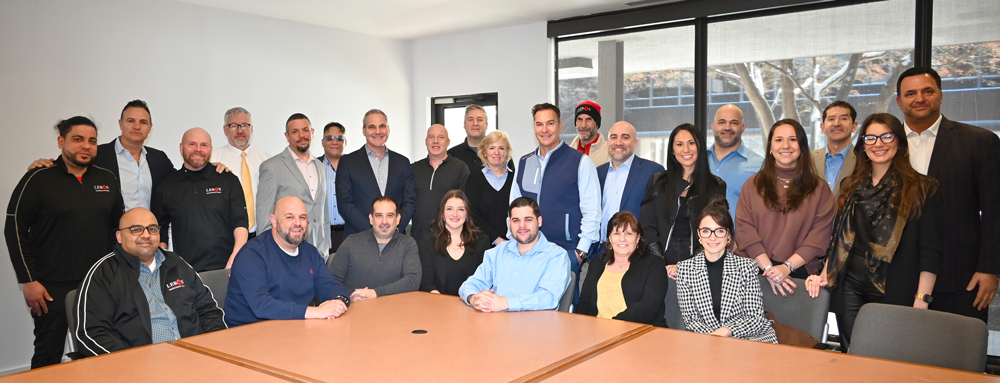 The Leros Transportation Group management team “Our biggest challenge—and it’s why safety is so important for all operators—is high insurance rates. This is, without a doubt, the biggest problem right now. But that being said, if you run more efficiently, and safer, you’re going to have more competitive rates. Obviously, safety is the number one priority because you want your client to get from point A to point B safely. However, it is also a priority because the reality is, if you have a lot of incidents or accidents, you’re going to be out of business because you’re uninsurable,” says Nyikos.
The Leros Transportation Group management team “Our biggest challenge—and it’s why safety is so important for all operators—is high insurance rates. This is, without a doubt, the biggest problem right now. But that being said, if you run more efficiently, and safer, you’re going to have more competitive rates. Obviously, safety is the number one priority because you want your client to get from point A to point B safely. However, it is also a priority because the reality is, if you have a lot of incidents or accidents, you’re going to be out of business because you’re uninsurable,” says Nyikos.
To combat high insurance rates and maintain an excellent safety reputation, Leros has a program that utilizes technology and analytics, which has seen the company change chauffeur behavior.
“I tell everyone, it’s great that you have cameras in the car, but realistically, it’s not worth anything if you’re not doing anything with that data. We have a department that catches incidents on camera and sends reports to the managers every single morning—whether it’s a chauffeur driving too quickly or an accident that occurred because they looked at their phone. With today’s cameras, there’s AI technology that can see if a chauffeur takes their eyes off the road, which will be recorded as an incident. We’re then able to go directly to the chauffeur and discuss the incident; if they’re a repeat offender, we’ll get rid of them.”
By keeping a keen eye on chauffeurs and successfully changing behavior through their safety program, Nyikos says that Leros avoided exorbitant rate increases.
“We didn’t get hammered by insurance this year. When the insurance company came in and saw what we were doing, they were impressed. We also just went through a Federal Motor Carrier Safety Administration audit, and the inspector said that it’s the best program he’s seen. It’s a team effort and we have a system in place where we’re proactive to prevent accidents. Because of that system, and the way we monitor everyone, we did not have an increase in our rates—and we locked in for 18 months,” says Nyikos.
A few other hot-button issues faced by the executive are electric cars and green initiatives.
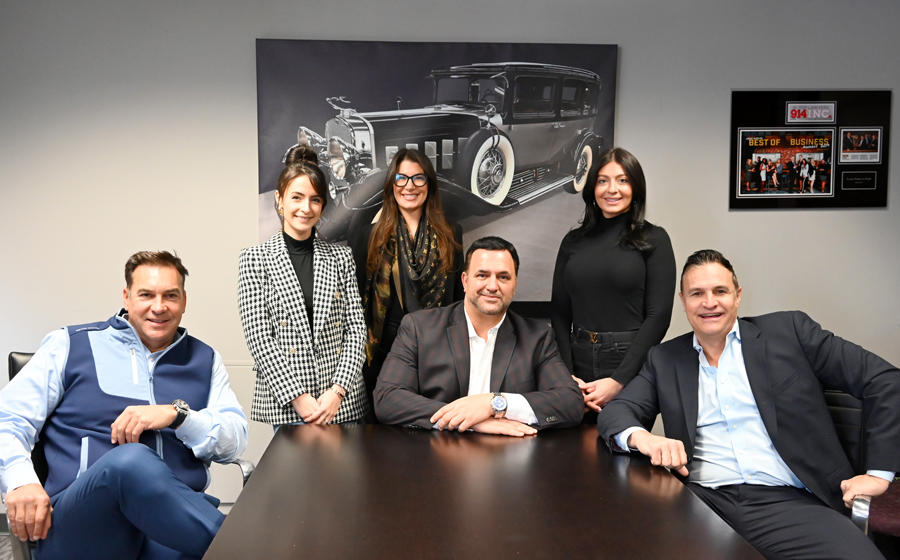 L to R: Jeff Nyikos, Director of Corporate Events Arianna Burke, Director of Events/Reservations Kelcy Moran, Michael Basso, Chauffeur Manager Victoria Vosler, and Chris Nyikos “This is something that is important, but it largely depends on the economics. For example, if a client wants us to use an electric bus and we tell them that it costs $1 million to run one versus $500,000 for a traditional bus—are they willing to pay double? It simply has to make financial sense for all parties. Furthermore, we’re located in the Northeast where the EV charging infrastructure isn’t as in place as on the West Coast. Plus, the weather plays a factor. Right now, in the Northeast and the Midwest, it’s zero degrees, and an EV isn’t getting the same capacity on a charge, which is important when you’re running a business based on logistics. Clients, from time to time, will inquire about EVs, but they usually decide not to move forward if it affects cost or service. Occasionally, a customer will request hybrid vehicles, and we’ll get them, but on a day-to-day basis, we don’t have a single account that only requires green vehicles.”
L to R: Jeff Nyikos, Director of Corporate Events Arianna Burke, Director of Events/Reservations Kelcy Moran, Michael Basso, Chauffeur Manager Victoria Vosler, and Chris Nyikos “This is something that is important, but it largely depends on the economics. For example, if a client wants us to use an electric bus and we tell them that it costs $1 million to run one versus $500,000 for a traditional bus—are they willing to pay double? It simply has to make financial sense for all parties. Furthermore, we’re located in the Northeast where the EV charging infrastructure isn’t as in place as on the West Coast. Plus, the weather plays a factor. Right now, in the Northeast and the Midwest, it’s zero degrees, and an EV isn’t getting the same capacity on a charge, which is important when you’re running a business based on logistics. Clients, from time to time, will inquire about EVs, but they usually decide not to move forward if it affects cost or service. Occasionally, a customer will request hybrid vehicles, and we’ll get them, but on a day-to-day basis, we don’t have a single account that only requires green vehicles.”
Of course, issues like insurance and the recently implemented congestion pricing in New York City are at the forefront of concerns for local industry associations, and Nyikos is proud to be affiliated with a number of organizations.
“Associations are extremely important, and we’re involved in a variety of them,” he says. “We’re members of associations that are industry-specific, like the Chauffeured Transportation Association of New Jersey, which represents our voice locally. Similarly, being involved with the National Limousine Association and going to Day on the Hill once a year in Washington, D.C. is vital to address issues. But we’re also part of associations like the Global Business Travel Association and Meeting Professionals International, which helps us understand corporate travel and meeting and events while growing our business within those sectors.”
Nyikos says that Leros is also a member of regional business associations, such as the Business Council of Westchester.
“Those sorts of groups are important to get your name out there within your area. I’m also involved in another group that works on self-improvement and is a network of business owners. It’s a smaller group of 30 people in different industries. We talk about goal setting and what we can do to better ourselves in the community, whether it’s partnering with charities or working on your health or leadership skills. No matter what size company you have, it’s key to be involved in as many associations as possible that will benefit your business. You’ll never know when opportunities are going to arise. And if you’re in your office all the time, and not out there marketing or selling yourself, you’re going to lose out on opportunities,” he says.
As Nyikos looks to 2025, he sees it as the year of AI—but not just the dashcams or other cutting-edge technology streamlining businesses with artificial intelligence.
“This year, AI also means acquisitions and infrastructure. We’re going to continue to acquire companies and build our infrastructure and national network. We’re implementing a new phone system, and we’re going to adopt new technology, whether it’s in-car technology or any other software that makes us more efficient. So, our focus for 2025 is running as efficiently as possible,” he says.
As a frequent participant in the Operator Mentoring Program at the fall CD/NLA Show, Nyikos believes imparting wisdom and sharing advice with his peers is critical for the industry’s success.
“The one piece of advice I’d give is to invest in yourself. You have to lead the ship, and people need to look to you as a role model. You should always be investing in yourself and be out there promoting your business. At the end of the day, especially in this industry, you are your brand. It’s also about giving back, which doesn’t necessarily mean just financially. It could be giving back through time, resources, and experiences. If I can help out a younger operator with a piece or two of advice, that’s a positive thing.” [CD0225]


